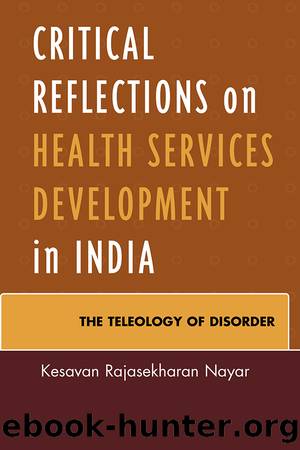Critical Reflections on Health Services Development in India by Nayar Kesavan Rajasekharan;

Author:Nayar, Kesavan Rajasekharan; [Nayar, Kesavan Rajasekharan]
Language: eng
Format: epub
Publisher: Lexington Books
Published: 2014-08-15T00:00:00+00:00
4
Centrality of Decentralization and Marginalization of the People
Decentralization in recent years has become a buzzword to make governance more acceptable to the people. From the operational point of view, decentralization has become necessary given the extreme form of centralization especially in development and welfare sectors and in some way to give a sense of peopleâs participation in the programs evolved by the state although the paternalistic character of the state-driven programs continue to be strong. However, the legislation and decentralization initiatives of the center have led to some dilution and devolution of power to the peripheries. The Weberian justification of centralization based on cost-effectiveness, efficiency, and coverage has also been diluted which led to a sense of uncertainty and disquiet. And it was in the nineties and at the beginning of the new millennium that there was a renewed interest in decentralization which was largely due to the funding strategies and the implementation of structural adjustment and reform strategies in many countries and we find proliferating literature on different dimensions of decentralization. However, the interest has waned in recent times and the initial enthusiasm for decentralization has also reduced probably due to the lack of interest among the funding agencies such as the World Bank. There is also a trend toward re-centralization in some European countries where decentralization was implemented earlier (Saltman, 2008). A large number of state institutions are seizing the opportunity to capture financial and political powers devolved earlier to lower levels. Saltman suggests that the future will see many European countries tightening their controls over fiscal and quality matters in health care which could also weaken democratization at the regional and municipal levels.
Notwithstanding these waning interests, the role of the people in decision-making and governance is realized through processes such as decentralization and therefore with respect to health and health services, it becomes necessary to examine decentralization and its complexities in this chapter. And, in this context, there are both negative and positive forces which shape these processes at the individual, organizational, and societal levels (Huss et al., 2011). The whole approach of decentralization also has a number of tools, paraphernalia and methodologies and we may examine some of these complexities in detail while we will provide some indicative analysis in other areas. The chapter is mainly based on a review of salient literature and an iterative use of writings and papers on decentralization and allied themes and partly based on studies and fieldwork carried out for writing those papers.
A number of approaches to decentralization have been evolved, and it is interesting that they are targeted on the so-called resource-poor settings in terms of money, material and even intellectual resources! (Bossert, 1998). Rondinelliâs much used categorization of decentralization process as devolution, deconcentration, delegation, and privatization was also addressed to developing countries (Rondinelli, 1983). In fact, such a categorization has been used to usher in privatization under health sector reforms as one of the strategies toward decentralization. The World Bank adopted such an approach to categorize
Download
This site does not store any files on its server. We only index and link to content provided by other sites. Please contact the content providers to delete copyright contents if any and email us, we'll remove relevant links or contents immediately.
Human Diseases (MindTap Course List) (by Team-IRA) by Marianne Neighbors Ruth Tannehill-Jones(890)
Cancer Cell Culture by Unknown(449)
The Neglected Dimension of Global Security: A Framework to Counter Infectious Disease Crises by National Academy of Medicine Secretariat(441)
Statistical Methods in Health Disparity Research by J. Sunil Rao(426)
Imaging in Urology by Mitchell Tublin MD Joel B Nelson MD(425)
Health Behavior: Theory, Research, and Practice by Karen Glanz & Barbara K. Rimer & K. Viswanath(371)
Achieving Procreation : Childlessness and IVF in Turkey by Merve Demircioğlu Göknar(370)
Short Course in Medical Terminology by Nath Judi L.;(352)
Clinical Research in Occupational Therapy, Sixth Edition by Martin Rice;(321)
Wilkins' Clinical Practice of the Dental Hygienist by Boyd Linda D.;Mallonee Lisa F.; & Lisa F. Mallonee(318)
Murray's Basic Medical Microbiology E-Book by Murray Patrick R.;(302)
Anatomical Kinesiology by Gross Michael;(300)
Neuroscience Fundamentals for Rehabilitation by Lundy-Ekman Laurie(299)
Psychedelics As Psychiatric Medications by Nutt David;Castle David;(290)
The Human Central Nervous System by Unknown(283)
A Pocket Guide for Medical Students: From Enrollment to Job Interviews by Sarah Cuschieri(282)
Rang & Dale's Pharmacology 9th Edition plus Flashcards 2nd Edition by Unknown(274)
The Handbook of Medicinal Chemistry by Simon E Ward;Andrew Davis;(263)
Public Health and Society: Current Issues by Burke Lillian D.;Weill Barbara;(255)
